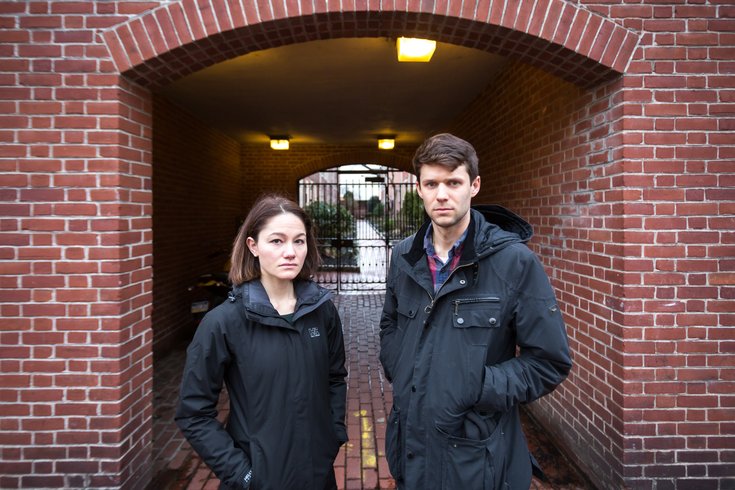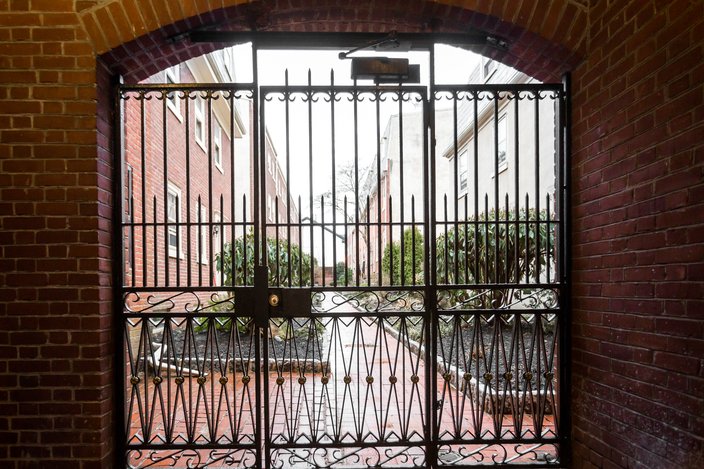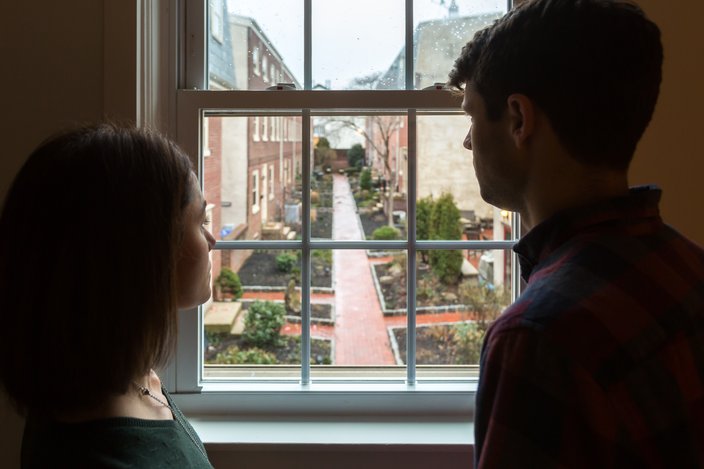
February 16, 2018
 Thom Carroll/PhillyVoice
Thom Carroll/PhillyVoice
Queen Village residents Meagan Regina and Matthew Iannone stand near the common-entrance gate that's turning the home of their dreams into a noisy nightmare. The tunnel and gate are situated under their dining room.
Meagan Regina and Matthew Iannone found the home of their dreams in Queen Village, or so they once blissfully thought.
Not only does their Front Street property date back to 1744 – a bonus for Regina, who has a personal and professional love of history – but the young couple found themselves in the perfect catchment area for schools. That's a major key for any couple intending to raise a family in Philadelphia.
The original footprint has a stately feel.
Historical knickknacks fill a curio cabinet near the front door. They include a medical journal entry from a physician at the former College of Physicians who lived there from 1847 to 1892, a photo of a Pennsylvania House of Representatives member who owned the house from 1892 to 1924 and a handwritten early 19th century application for the Philadelphia Contributionship Fire Insurance, which was founded by Ben Franklin.
And there are framed pictures on display chronicling each property transaction through the years.
The second-floor addition, built in the 1960s, has become a source of seemingly never-ending frustration, though.
Beneath their dining room sits the common-area entrance gate to an interior, bricked courtyard at Clymer Court, a 14-unit complex set off Front Street. Clymer Court is overseen by a homeowner's association.
When residents enter and exit, sounds and vibrations from that steel gate echo and rattle through the home, purchased in August 2016. The frequency turns what could be written off as a minor inconvenience into an incessant nuisance.
It wasn't the type of thing that turned up in their pre-purchase home inspection. The couple said they didn't even notice it when they toured the home before, and on, the day of settlement.
They loved the home so much that, in a letter to the previous owners before the sale went through, Regina wrote that, "From the moment we walked through your front door, Matt and I could envision the next chapter of our lives unfolding. It was an incredible feeling for us because we have been struggling to decide what exactly our next chapter looks like."
In the year-and-a-half since, the gate has become a regular source of frustration and tension between the couple and the homeowner's association that they claim isn't willing to compromise to remedy the situation. (The board, in October 2016, rejected their request to share the costs.)
"Until the incessant noise stops, the gate will serve as a constant distraction from the rest of our lives." – Meagan Regina
This, even after the Department of Health's Air Management Services issued a noise violation to the HoA after City Councilman Mark Squilla's office intervened last year. It's basically an "abuse of power" situation, the couple said.
To say Meagan and Matthew, whose 2013 wedding prompted a romantic write-up in a local newspaper, are at their wit's end with the subsequent mess would be an understatement.
"This issue is caused by an HOA-owned gate. It's totally within their power to quickly and relatively cheaply remedy. But because we're the only people suffering, the Board has repeatedly decided against addressing the issue," Meagan told PhillyVoice. "It doesn't help that we're a young couple who bought into an established community in the wealthier Queen Village neighborhood."
Though the HOA and property manager didn't respond to several requests for comment on this story, the quality-of-life battle has prompted a legal battle that's costing the young couple more money than they expected to shell out after buying the home of their dreams.
In fact, legal fees still accumulating for both sides could have replaced the gate several times over.
Meagan Regina and Matthew Iannone hear the sound – and vibration – of this gate opening and closing in their home – typically from 100 to 150 times a day.
Last month, Meagan and Matthew sat in their dining room with stacks of documents and laptops out on the table.
They were prepared to tell their story, which they did for more than an hour as the gate opened and closed a few times audibly through the walls and hardwood floors.
They had evidence about the frequency of gate openings from Friday, November 3 through Friday, November 10. (It opened 1,088 times over the course of those eight days, with a high of 171 times on Monday and a low of 103 times on Wednesday, they said.)
They spoke about their August 24, 2016 closing, and their love for the home they move into after selling their place near Sixth and Fitzwater streets.
"It was a 'We're not going to fix it and if you try to, we're going to sue' situation." – Matthew Iannone
Soon, they'd hear a pesky intercom near the gate. Their complaints were met with corrective action, only after a snarky "apparently you have to be inside to hear it" email from the HOA.
For nearly a year after the sale, they lived with family in central New Jersey. The sound of the metal gate – which according to the lawsuit "is mounted to a brick entryway which connects to (their) home" – was initially too much to bear.
Things started smoothly enough, with the property management company bringing in a contractor to inspect the gate and determine the cost of a solution. But that went nowhere.
By the end of November, the couple obtained estimates of their own for the work; $4,800 was the best option, and the plan received Historical Commission approval. The couple, which pays $136 a month in HOA fees to cover snow removal, trash pickup and landscaping, said they were willing to reach a mutually acceptable deal to cover the cost of the improvements.
That became necessary after foam insulation installed by Clymer Court didn't do enough to silence the gate.
"Let's compromise," said Matthew of their mindset. "Per our deed, it's on our property and we don't have to leave it connected to our house. We were told we'd get sued for violation of HOA rules. It was a 'We're not going to fix it and if you try to, we're going to sue' situation."
They met with HOA members at a nearby Starbucks in December 2016 to try to strike an agreement. That meeting ended with a promise to reconvene once the board had time to consider the situation, but six to eight weeks passed and the couple heard nothing.
In March, an email to the couple noted that, "The HOA has received notice of a noise complaint made by you. The board is confused by this development."
It went on to say that the HOA was waiting for them to provide estimates and that the "board looks forward to reviewing (and hopefully approving) your estimates."
It was not meant to be, so Iannone and Regina sought help from city agencies and officials.
In April, June and August 2017, the city conducted "noise surveys" inside their home.
"On the second floor the operation of the entryway … exceeds the restrictions of the Philadelphia Noise Code," reads the Air Pollution Control inspection report.
On August 25, 2017, Squilla sent a letter to the homeowners' association on the residents' behalf.
"My office has been advised that Air Management Services has issued a violation to you regarding noise caused by the entryway gate into the Condominium complex as it exceeded the restriction of the Philadelphia Noise Code. Please make the necessary repairs as soon as possible to insure compliance," it read. "Thank you for your immediate attention."
"I thought this issue was resolved," the councilman said when PhillyVoice sought comment from him in late January.
"I, too, thought the issue as resolved," said his chief-of-staff Anne Kelly. "Once it goes to court, there really isn't much we can do."
The violations are somewhat toothless. A bill isn't issued until the situation is remedied, Iannone said. (And all it would take for that to happen is mounting the gate into the ground instead of their wall.)
"We were hopeful to solve this," he said. "They have no interest in meeting us halfway. They were in the house and called the sounds 'unimpressive.' At a homeowner's association meeting, they accused us of having 'buyer's remorse.'"
Regina said there's no such remorse. This is their family starter home, in the area in which they wanted to live. Besides, "one way or another, we're screwed," she said, since even if they did choose to sell, they'd have to disclose it to potential buyers.
"For such a simple problem, there's been so much stress," added Regina, who estimated the cost of commuting for 10 months at $3,300 in tolls, nearly $1,500 in HOA dues, nearly $13,000 in mortgage payments, $2,353 in utilities and the "inability to start a family in January 2017." They also claim to have put some 27,450 miles on their personal vehicles during their commutes.
Regina said that they have had to put off having a child because of the dispute. Among the reasons for that: How could you expect a baby to take a nap when the sound of a gate is echoing through the home? The sound isn't enough to make you cover your ears, but it's distracting enough to interrupt a conversation, as it did several times during the interview. It's a nuisance, not an air-horn implosion of peace of mind.
"We've been ostracized. Nobody says hi to us. Once the lawyers' letters started, it was like a flip switched," Iannone said. "It's awkward when I see people .... Nobody's piping up on our behalf. I don't know if they're scared of (HOA president Ellen O'Hara) or just being kept out of the loop."
A pair of emails seeking comment from O'Hara went unreturned in January and February. Same goes for attorney Eamon Merrigan, who represents the Clymer Court Homeowners Association in a civil case brought by the couple in November.
The couple's suit cites a situation that has invaded their rights "to quiet and peaceful use and enjoyment of their residence."
Meagan Regina and Matthew Iannone look out onto the courtyard at Clymer Court in Queen Village. The only time they go back there is when Matthew takes out the trash, they said.
In a subsequent filing, Merrigan sought to have the complaint dismissed with prejudice because of "legal insufficiency."
In that January 9 response, the HOA claims the couple didn't live in the property between purchase and July 24, 2017 but now "claim that due to financial reasons, they have no choice but to reside at the property."
"They have pled no facts to support the position that their claimed relief is the only remedy available or that less intrusive actions would be insufficient to dampen the noise to an acceptable level," it reads. "Plaintiffs have not pled any facts sufficient to show that the nuisance rendered their home uninhabitable.
"HOAs are great when all members agree and they can come together to decide on something inane like landscaping or a new grill. But they're absolutely horrible when they decide on a whim not to support an individual with a real issue." – Meagan Regina
"As for the animosity from their neighbors, Plaintiffs specifically pled that this animosity is the result of their own actions and not Defendant."
In other words, they've proven no ill-will on behalf of fellow residents, and that the friction is a direct result of the complaints they chose to level against their neighbors.
The response also retorts that their complaints don't rise to the level of causing "significant harm," and maintains that they "provide no factual basis" to support the claim that "they were unable to produce an offspring as a result of the noise at issue."
When that came up, the couple responded that living in a house with one's parents (and in-laws) isn't exactly the best environment for the actions necessary to conceive a child.
"My husband and I were unable to start a family as we intended to in January 2017 prior to purchasing the residence, as a direct result of the untenable living environment," she said.
To the point that they "have not pled any facts sufficient to show that they nuisance rendered their home inhabitable," they note that an incessant nuisance was enough to impact their mental well-being to the point of having to get away from it.
The case is now winding its way through the legal system. They don't yet know much besides the outcome would have been considerably different, and less expensive on both sides, had they just found a mutually agreeable compromise at some point since the summer of 2016.
Regina finds herself mulling the fact that "HOAs are a terrible model when you have a real problem that doesn't impact the other members of the community."
"HOAs are great when all members agree and they can come together to decide on something inane like landscaping or a new grill," she said. "But they're absolutely horrible when they decide on a whim not to support an individual with a real issue.
"Not only can they stop you from resolving the problem, but they can blackball you in the community, making you feel like you have to look over your shoulder every time you walk out the front door. Nothing hurts more than overhearing conversations through our back windows about how awful we are."
They rue the fact that they now find themselves "at the mercy of a group of people who don't know us or care about us as people."
It's heartbreaking, she said, to see how their life isn't what they expected it to be when they moved into their "ideal" starter home.
"We instantly saw ourselves starting the next chapter of our lives in this house, but have since lived in constant fear that we may have to give up a house that we invested so much time, energy, resources and hope into," she said. "The nearly constant penetration of this noise into our house at all hours of the day and night completely removes the sense of peace and enjoyment one expects in their home."
They haven't given up all hope, though. But it's all contingent on making that darn sound disappear.
"We'd be happy to return home after a day away. We'd be happy to have friends over. We'd try to build relationships with the community members if they'd be open to getting to know us for who we are," Regina said. "It's so hard to commit to anything when you feel like you might be leaving.
"We do believe we can stay if this were to get resolved. There's so much more to this house and this neighborhood than this gate. But until the incessant noise stops, the gate will serve as a constant distraction from the rest of our lives."
 Thom Carroll/PhillyVoice
Thom Carroll/PhillyVoice Thom Carroll/PhillyVoice
Thom Carroll/PhillyVoice